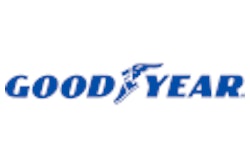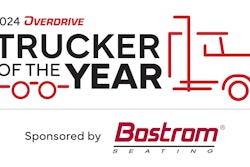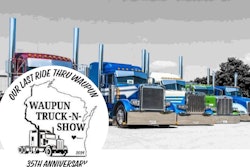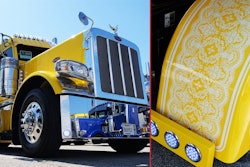At approximately 12:50 a.m. (CDT) Saturday, Sept. 8, the first Mexico-domiciled truck authorized under the Bush administration’s pilot program to transport cargo within the United States cleared federal inspections at the U.S. border in Laredo bound for North Carolina.
In light of the special occasion, border agents had moved the 2007 Freightliner owned by Transportes Olympic of Nuevo Leon, Mexico, to the front of the line for an extensive inspection.
After more than two hours of inspections, driver Luis Gonzalez headed north on I-35 and less than 30 minutes later crossed the 25-mile commercial zone that has been the boundary for Mexican trucks since the United States closed its border to its southern neighbors’ long-haul truck traffic in 1982.
Despite scattered protests from some American trucking and labor organizations since the Federal Motor Carrier Safety Administration gave the green light to the pilot program Thursday night, the truck crossed without incident, reports Jorge Arboleda, editor of Tuscaloosa, Ala.-based Transportista magazine. Arboleda rode along with Gonzalez as he left Monterrey, Mexico, at about 6 p.m. (Transportista, a Spanish-language trucking magazine, is owned by Randall-Reilly Publishing, which also publishes eTrucker, Overdrive, Truckers News, Commercial Carrier Journal and other trucking publications.)
Forty-year-old Fernando Paez, owner of Transportes Olympic, was both excited and a little nervous Friday afternoon.
“We’re only taking one truck just in case the Teamsters burn one of them,” Paez said jokingly. “Hopefully, we won’t have any trouble.”
Paez received authority from FMCSA Thursday night as the first Mexican carrier to participate in the pilot program. Meanwhile, the Mexican government approved El Paso, Texas-based Stagecoach Cartage and Distribution as the first U.S. trucking company to operate in Mexico.
Although this was the first Mexican pilot program truck to enter the United States, Transportes Olympic and its sister U.S. company, OMC Carriers of McAllen, Texas, which Paez also owns, have hauled international cargo under a lease agreement for three years.
Teamsters held protests at some border entry points Thursday in anticipation that the Bush administration was poised to give the go-ahead for a one-year pilot program that will eventually allow up to 100 Mexican carriers access to U.S. highways in fulfillment of U.S. obligations under the North American Free Trade Agreement.
The Owner-Operator Independent Drivers Association petitioned the U.S. Department of Transportation Friday for a review of the pilot program and a stay on the program pending review in the U.S. Court of Appeals for the District of Columbia. Todd Spencer, OOIDA executive vice president, said the program did not follow congressional directives and legal requirements.
“We believe we have a strong case against what is being called a pilot program but is actually a stealthily implemented, pre-ordained plan to fully open our highways to Mexican trucks,” Spencer said. “This is all done in the name of global economics and cheap labor.”
According to the U.S. Department of Transportation, 32 Mexico-domiciled carriers have passed the Pre-Authorization Safety Audit and these carriers intend to conduct operations in the United States with 174 trucks. DOT estimates that if 100 carriers participate in the one-year pilot program, they will operate more than 500 trucks.
U.S. Rep. James Oberstar (D-Minn.), chairman of the House Transportation and Infrastructure Committee, along with other congressional members and representatives of OOIDA, the Teamsters and the Truck Safety Coalition blasted the pilot program for ignoring public opinion and putting the American public in danger because, they say, Mexican trucks are unsafe.
“We do not find that the Mexican system is equivalent to the American system,” said Rep. Peter DeFazio (D-Ore.)
But FMCSA officials say the pilot program has met all congressional requirements and all Mexican trucks and Mexican truck drivers will be held to the same strict standards as American truckers.
The U.S. House of Representatives has tried several times in recent months to block the program.
The Committee on Transportation and Infrastructure approved H.R. 1773, the Safe American Roads Act of 2007, 66-0 on May 2; the House passed it 411-3. This legislation would allow a three-year pilot program, but only under specific conditions and once all prerequisites are met to ensure safety.
The bill includes mechanisms to shut the program down if there is any detrimental effect on safety. The bill also requires Congress to pass additional legislation for the border to open fully beyond the limited pilot program.
In May, Congress passed and President Bush signed supplemental funding legislation that imposed a number of conditions and prerequisites on the proposed pilot program, including some – but not all – of the measures included in H.R. 1773.
On July 24, the House passed the fiscal 2008 funding bill (H.R. 3074) for the Department of Transportation and other agencies that included a provision to bar DOT from using any funds to implement its proposed pilot program.
“Democrats and Republicans are united in protecting America’s highways. Only the White House seems to be out of the loop,” said Rep. Nancy Boyda (D-Kan.).
Paez says the Mexican trucking industry is being painted with a broad brush. He started his trucking business 17 years ago, following American practices and rules, including his hiring practices, creating individual files for all of his employees, and carrying out drug tests and safety training sessions. He also teaches drivers English, which he speaks fluently.
Transportes Olympic operates 45 trucks – all of them late-model Freightliners built in the United States under U.S. environmental and safety standards.
In response to criticism that Mexican carriers often don’t keep accurate records, Paez says he has records of each truck’s maintenance, identified with its VIN number.
Paez says he is proud that his company was the first chosen. “I have spent years preparing my company for this moment.”
–By Randy Grider; Avery Vise and Jill Dunn contributed to this report
ATA Asks Court to Stay Hours Ruling
The American Trucking Associations said Sept. 6 that it was filing a motion asking the U.S. Court of Appeals for the District of Columbia Circuit to stay the effectiveness of its decision voiding the 11-hour and 34-hour restart provisions of the hours-of-service rules. A stay would leave the two provisions in place pending a review by the Federal Motor Carrier Safety Administration.
ATA says its motion for a stay was necessary because FMCSA failed to respond to the group’s request for an interim final rule that would have readopted the 11-hour and 34-hour provisions for a short interim period. Without a request by some party to the case for a stay, the court’s decision could have become effective on Friday, Sept. 7.
The mere act of filing a motion for stay serves as a short-term stay because under normal procedures the appeals court will consider responses to ATA’s motion during a period of approximately 14 days. So the 11-hour and 34-hour provisions should remain in effect at least until late September, ATA says. In addition, the delay gives FMCSA additional time to consider whether it wants to adopt an interim final rule as ATA previously requested.
The appeals court ruled July 24 that provisions of the HOS rule that allow 11 hours of driving before mandatory rest and a resetting of the cumulative duty-time limits following a 34-hour break were invalid because FMCSA failed to give proper notice of changes in the methodology it used for analyzing crash risk.
On July 31, ATA urged Transportation Secretary Mary Peters to seek a stay of the court’s decision pending FMCSA review. As of Sept. 6, the government had not sought such a delay in the ruling’s effectiveness.
– Avery Vise
Roadway Driver Claims Grand Champion Title
Alphonso “Al” Lewis, a Roadway driver based in Montgomery, Ala., has been named the 2007 National Truck Driving Grand Champion.
Lewis’ driving skills and knowledge of transportation and truck safety information topped those of 377 other drivers from across the United States in the National Truck Driving Championships, held Aug. 21-25 in Minneapolis.
The 70th annual “Super Bowl of Safety” was sponsored by the American Trucking Associations. The contestants were the state champions (in eight truck types) from all 50 states.
Collectively, they have driven more than a half-billion accident-free miles. En route to his title, Lewis had logged 21 accident- and injury-free years as a driver. Lewis is the first African-American winner in the 70-year history of the championships.
In their respective classes, drivers tested their expertise in the driving skills they use daily. The competition course inside the Minneapolis Convention Center challenged their knowledge of safety, equipment and the industry. The skills course tested drivers’ ability to judge distances, maneuver tight spaces, reverse, park and position their vehicles exactly over scales, before barriers or around curves.
Lewis also won the individual Four-Axle truck driving competition. Joining Lewis as champions in their respective classes:
- Straight Truck: Scott Watts, FedEx Express (Anchorage, Alaska).
- Three-Axle: John Hazlett, ABF Freight System (Philadelphia).
- Five-Axle: Kevin Scott Harris Sr., ABF Freight System (North Greenbush, N.Y.).
- Five-Axle Sleeper: Warren Lewis Jr., Hannaford Trucking (Lewiston, Maine).
- Twins: Dennis Day, Con-way Freight (Lawrenceville, Ga.).
- Flatbed: John Smith Jr., FedEx Ground (Tupelo, Miss.).
- Tank Truck: Dale Duncan, Con-way Freight (Chula Vista, Calif.).
Lewis succeeds Duncan as the National Grand Champion.
Jason Matte, a five-axle FedEx Freight driver from Pearl, Miss., was named 2007 Rookie of the Year. Matte, who has been a professional truck driver for nine years and has more than 700,000 accident-free miles, also was the 2007 Mississippi Truck Driving Championships Rookie of the Year.
– From Staff Reports
White House Reviews Driver Training Proposal
The White House Office of Management and Budget is reviewing proposed regulations to mandate behind-the-wheel training as part of the commercial driver’s license requirements for entry-level commercial motor vehicle drivers. Details of the proposal will not be released until OMB completes its review and the Federal Motor Carrier Safety Administration publishes the rulemaking in the Federal Register.
FMCSA’s proposal responds to a December 2005 ruling by the U.S. Court of Appeals for the District of Columbia Circuit that the current regulation for minimum entry-level driver training is inadequate because it doesn’t require any on-road training.
Current regulations, adopted in May 2004, require only classroom education and in only four areas: medical qualification and drug and alcohol testing, hours-of-service rules, wellness and whistleblower protection. The Advocates for Highway and Auto Safety challenged those regulations, saying FMCSA ignored its own earlier recommendations about the need for more rigorous minimum training standards.
The appeals court agreed, ordering FMCSA to come back with new rules. But the court left the existing regulations in place in the interim, saying that the regulation, “while plainly inadequate, may do some good, if it does anything at all.”
– Avery Vise
Contractor of the Year Receives 9900ix Tractor
Charles Maly, leased to Shaffer Trucking of York, Neb., came home from the Great American Trucking Show in Dallas with a new truck, his grand prize in the Truckload Carriers Association’s 20th annual Independent Contractor of the Year contest.
The International 9900ix was donated by International Truck and Engine Corp., which also will cover the federal excise tax.
“International gave me the freedom to select the model and spec the truck however I wanted without any restrictions,” Maly said. “This is very important to me because it allowed me to personalize the truck.”
The International 9900ix is powered by a 500-hp Cummins ISX engine and equipped with an Eaton transmission, 10 Goodyear G300 series radial truck tires, a pair of National premium cloth seats and a pair of Velvac aero bell tripod hood mounted mirrors.
The Independent Contractor of the Year contest is sponsored by the Truckload Carriers Association, International Truck and Engine and Overdrive magazine. Truckers News sponsors the Company Equipment Driver of the Year.
– From Staff Reports
FYI | News Briefs
Virginia Shoulder Parking Crackdown
State troopers in Virginia have been instructed to vigorously enforce a state law that prohibits tractor-trailers and other motor vehicles from stopping on the shoulders of interstate highways, except in case of an emergency, accident or mechanical breakdown.
This action comes in response to several highway incidents.
Kenworth Sweeps J.D. Power Honors
Kenworth announced that it is the first truck manufacturer to sweep all three major categories in the annual J.D. Power and Associates Heavy Duty Truck Customer Satisfaction Study. Kenworth achieved the highest ranking in customer satisfaction among Class 8 truck owners in the Over the Road, Pickup and Delivery and Vocational Segments.
New Truckstops
Love’s has opened its 140th and 141st Travel Stops. The new locations are in Horse Cave, Ky., at Exit 58 from I-65 and in Boonville, Mo., at Exit 101 from I-70.
July Tonnage Index Up
The American Trucking Associations’ advanced seasonally adjusted For-Hire Truck Tonnage Index rose 0.3 percent in July, marking the first month-to-month increase since March of this year. The not-seasonally adjusted index decreased 2.7 percent from June to 111.0. On a seasonally adjusted basis, the tonnage index increased to 110.9 in July, which was the highest reading since April. Despite July’s sequential gain, tonnage was down 3.7 percent from a year earlier. Year-to-date, the tonnage index was 2.6 percent lower than the same period in 2006.
Paccar, Eaton Hybrid Class 8
Paccar and Eaton Corporation announced at the Great American Trucking Show that the two have joined forces to develop proprietary hybrid technology for heavy-duty commercial trucks in North America. The new products will be introduced exclusively in Kenworth and Peterbilt trucks. The target date for initial production is the end of 2009.
Dallas Tolls Increase, Go Electronic
The North Texas Tollway Authority has voted to increase toll rates Sept. 29 and begin converting its toll roads, including the Dallas North Tollway and the President George Bush Turnpike, to all-electronic collection next year. On the DNT, a five-axle truck currently pays $1.80 cash or $1.45 via TollTag to drive the main plazas north from Wycliff Avenue to Keller Springs, or south from Parker Road to Keller Springs. After the increase, a five-axle truck will pay $4 cash or $2.80 via TollTag.
Peterbilt Medium-Duty Hybrids
Peterbilt Motors Company said it will begin full production of its medium-duty hybrid electric vehicles in March 2008 and will offer heavy-duty hybrids for vocational and on-highway use in 2008 and 2010, respectively. The company delivered its first medium-duty hybrid vehicles – two Model 335 hybrids – this month to San Marcos, Texas-based McCoy’s Building Supply.
Truckers With Fred Support Thompson
Truckers with Fred is a new website dedicated to a Fred Thompson candidacy in the 2008 presidential campaign. “Truckers with Fred is exactly what it says,” says the website, www.truckerswithfred.com. “We are all truckers – drivers, owner-operators, mechanics, company owners and family.” The website notes a trucking connection through Thompson’s wife, Jeri. Her grandfather, Howard Dahlsten, began Dahlsten Truck Line in 1946 with one truck. The Dahlsten family continues to own all corporate stock in the Nebraska-based dry bulk and package service.
European Volvos With Alternative Fuels
In Europe, Volvo Group has produced seven demonstration trucks, equivalent to U.S. Class 8 heavy-duty trucks, each of which runs on a different renewable fuel. The seven fuels are biodiesel, biogas, a biodiesel/biogas mix, dimethyl ether, ethanol/methanol, synthetic diesel and a biogas/hydrogen-gas mix. Because all these fuels are made from renewable raw materials, unlike fossil fuels, their combustion adds no net carbon dioxide to the atmosphere, Volvo says.







